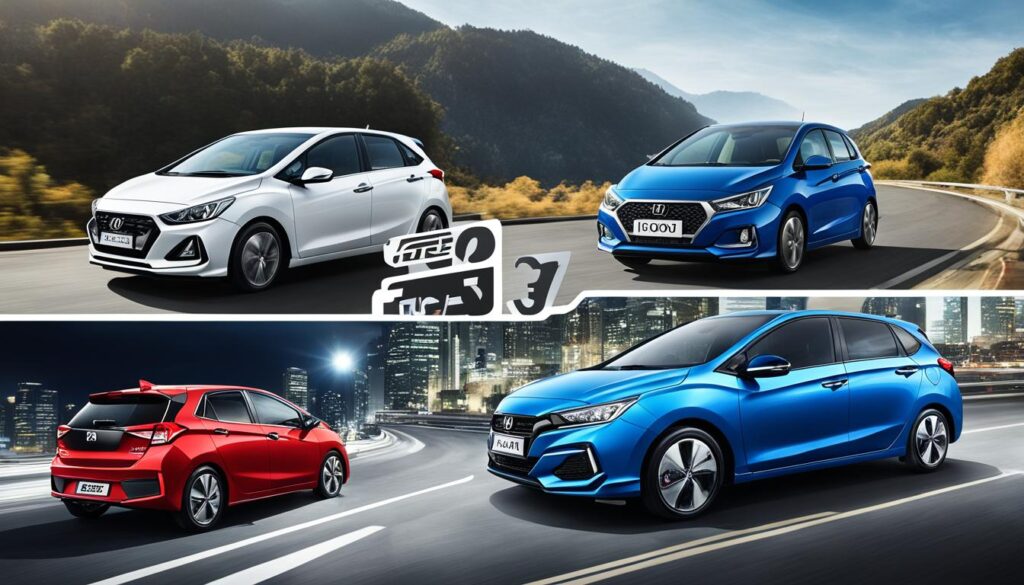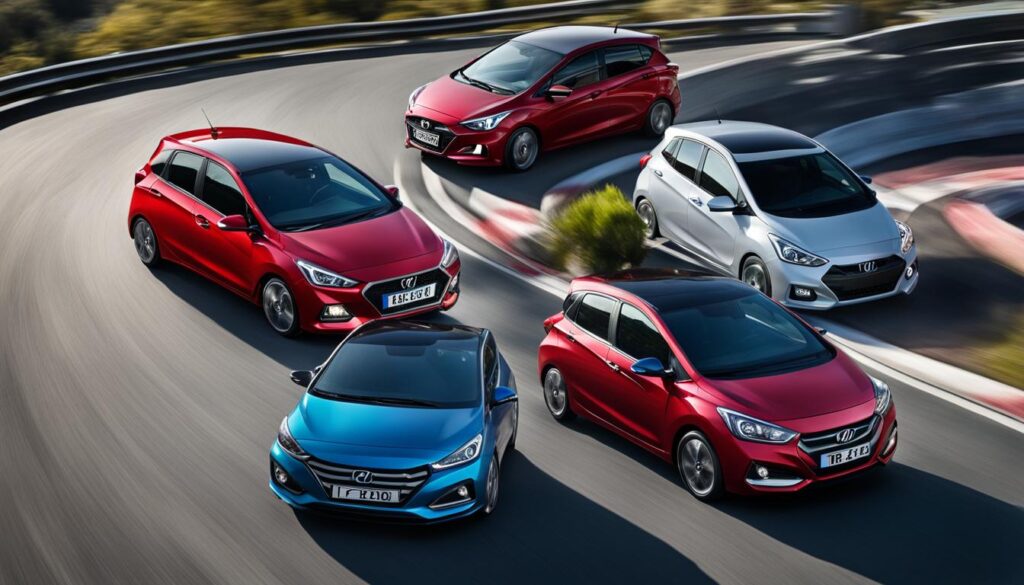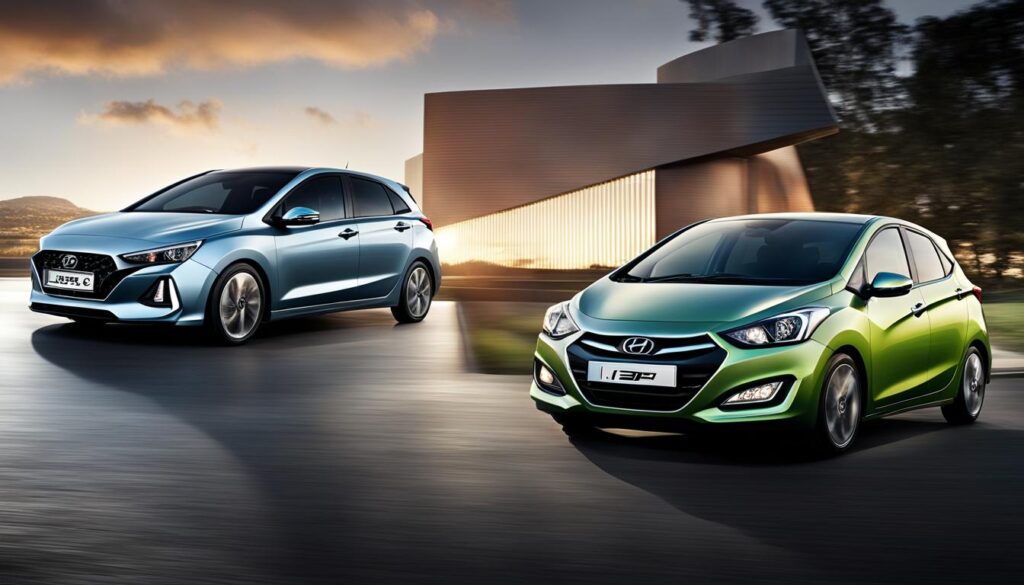Welcome to my in-depth comparison of two popular hatchback models: the Hyundai i30 and the Honda Fit. If you’re in the market for a practical and versatile vehicle, these two options are worth considering. In this article, I will break down their performance, features, value for money, fuel efficiency, and more, to help you make an informed decision.
Key Takeaways:
- The Hyundai i30 and Honda Fit are both competitive hatchbacks in the market.
- The Hyundai i30 offers great value for money with its range of features and performance capabilities.
- The Honda Fit stands out for its fuel efficiency and practicality.
- Both models come equipped with a variety of safety features to ensure your peace of mind.
- Your decision between the two will ultimately depend on your personal preferences and priorities.
Performance Comparison
When it comes to performance, the Hyundai i30 and the Honda Fit both deliver impressive results. Let’s take a closer look at their specifications.
The Hyundai i30 is equipped with a 2.0-liter naturally aspirated petrol engine that generates 120kW of power and 203Nm of torque. This engine provides ample power for daily driving, ensuring a smooth and responsive performance on the road.
On the other hand, the Honda Fit features a 1.5-liter i-VTEC petrol engine with 130hp and 114 lb-ft of torque. With its slightly higher horsepower, the Honda Fit offers a boost in acceleration and responsiveness, making it an engaging hatchback to drive.
Both models excel in delivering sufficient power for everyday needs, but the Honda Fit edges ahead in terms of horsepower, providing an extra punch when you need it.
| Model | Engine | Power | Torque |
|---|---|---|---|
| Hyundai i30 | 2.0L Naturally Aspirated Petrol | 120kW | 203Nm |
| Honda Fit | 1.5L i-VTEC Petrol | 130hp | 114 lb-ft |
Features and Technology
When it comes to features and technology, both the Honda Fit and Hyundai i30 offer a range of convenient and modern options to enhance your driving experience.
The Honda Fit comes equipped with a touchscreen infotainment system that provides easy access to your favorite music, navigation, and communication tools. Additionally, Bluetooth connectivity allows you to connect your smartphone seamlessly for hands-free calling and audio streaming. A rearview camera further enhances safety by providing a clear view of your surroundings when reversing.
On the other hand, the Hyundai i30 also offers similar features to keep you connected and entertained on the road. The touchscreen infotainment system provides access to various media sources, and Bluetooth connectivity enables effortless communication while driving. In addition, the Hyundai i30 boasts a luxurious leather seat trim, adding a touch of sophistication to the interior. Plus, its full-size spare wheel offers peace of mind in case of a flat tire.
Whether you opt for the Honda Fit or the Hyundai i30, you can expect ample technology and convenience options designed to enhance your driving pleasure.
Comparison Table: Features and Technology
| Features | Honda Fit | Hyundai i30 |
|---|---|---|
| Touchscreen Infotainment System | Yes | Yes |
| Bluetooth Connectivity | Yes | Yes |
| Rearview Camera | Yes | No |
| Leather Seat Trim | No | Yes |
| Full-size Spare Wheel | No | Yes |
As shown in the comparison table, both the Honda Fit and the Hyundai i30 offer advanced features like a touchscreen infotainment system and Bluetooth connectivity. The Honda Fit takes the lead by providing a rearview camera, while the Hyundai i30 offers luxurious touches such as a leather seat trim and a full-size spare wheel.
Value for Money
When it comes to value for money, both the Hyundai i30 and the Honda Fit offer competitive pricing in their respective segments. The Hyundai i30 starts at $27,790, making it an affordable option for those in the market for a hatchback. With its range of features and performance capabilities, the i30 provides excellent value for its price.
The Honda Fit, on the other hand, has a starting price of $26,870, which is slightly lower than the i30. This makes it an attractive choice for budget-conscious buyers. The Fit also offers good value for its fuel efficiency and practicality, making it a sensible option for those who prioritize these factors.
Price Comparison: Hyundai i30 vs Honda Fit
| Hatchback Model | Starting Price |
|---|---|
| Hyundai i30 | $27,790 |
| Honda Fit | $26,870 |
As seen in the table above, the Honda Fit has a slightly lower starting price compared to the Hyundai i30. However, both models offer excellent value for the features and performance they provide.

With their competitive pricing and well-equipped packages, the Hyundai i30 and the Honda Fit are both solid choices for those looking for a hatchback that offers great value for money.
Fuel Efficiency and Reliability
When it comes to fuel efficiency, the Honda Fit takes the lead with an impressive rating of 33 mpg in the city and 40 mpg on the highway. This means that you can save more money on fuel expenses and reduce your carbon footprint with the Honda Fit’s efficient engine.
The Hyundai i30 also offers decent fuel economy, with an estimated 28 mpg in the city and 37 mpg on the highway. While not as impressive as the Honda Fit, it still provides a good balance between performance and fuel efficiency.
In terms of reliability, both the Honda Fit and the Hyundai i30 have received positive reviews from drivers. They are considered dependable choices that offer peace of mind on the road. Whether you choose the Honda Fit or the Hyundai i30, you can trust that these hatchback models will keep you going for years to come.
| Model | Fuel Efficiency (City/Highway) | Reliability |
|---|---|---|
| Honda Fit | 33 mpg / 40 mpg | Positive reviews; considered dependable |
| Hyundai i30 | 28 mpg / 37 mpg | Positive reviews; considered dependable |
As seen in the table above, the Honda Fit excels in fuel efficiency, while the Hyundai i30 offers a decent balance between performance and fuel economy. Both models have a track record of reliability, making them reliable choices for hatchback enthusiasts.
Driving Experience
When it comes to the driving experience, both the Hyundai i30 and Honda Fit offer their unique advantages. Let’s take a closer look at what each model brings to the table.
Hyundai i30: Smooth and Comfortable Ride
The Hyundai i30 is designed to provide a smooth and comfortable ride. The suspension is tuned to absorb bumps and provide a controlled and refined driving experience. Whether you’re cruising on the highway or navigating through city streets, the i30 delivers a comfortable journey for both the driver and passengers.
The handling of the i30 is composed and stable, allowing for confident maneuvering around corners. The precise steering adds to the overall driving pleasure, providing a sense of control and responsiveness. Whether you’re taking a leisurely drive or embarking on a long road trip, the Hyundai i30 ensures a pleasant and enjoyable ride.
Honda Fit: Nimble and Agile Handling
If you prefer a more agile and nimble driving experience, the Honda Fit has you covered. This compact hatchback is known for its exceptional maneuverability, making it a breeze to navigate through tight urban spaces. The small turning radius and responsive steering allow for quick and effortless lane changes and parking maneuvers.
The Fit’s lightweight design contributes to its nimble handling, allowing it to easily dart through traffic and tackle winding roads with ease. Whether you’re zipping through city streets or exploring winding country roads, the Honda Fit provides a fun and engaging driving experience.

Both the Hyundai i30 and Honda Fit offer their unique driving experiences. The i30 provides a smooth and comfortable ride with composed handling and precise steering. On the other hand, the Fit offers nimble and agile handling, making it a joy to drive in urban settings.
In the end, the choice between the Hyundai i30 and Honda Fit will depend on your personal preferences. If you prioritize comfort and a refined driving experience, the i30 is an excellent choice. However, if you value nimble and agile handling for urban driving, the Fit might be the perfect fit for you.
Safety Features
When it comes to safety, both the Hyundai i30 and the Honda Fit prioritize the well-being of their drivers and passengers. These hatchback models are equipped with a range of advanced safety features that provide an extra layer of protection on the road. Let’s take a closer look at the safety technologies offered by each vehicle:
Hyundai i30 Safety Features
The Hyundai i30 incorporates cutting-edge safety systems to enhance driver confidence and minimize the risk of accidents. Some notable safety features of the Hyundai i30 include:
- Autonomous Emergency Braking: This intelligent system can detect potential collisions and automatically apply the brakes to prevent or mitigate the impact.
- Blind-Spot Monitoring: By using sensors, the i30 alerts the driver of any vehicles in their blind spots, reducing the chance of an accidental lane change.
- Lane-Keeping Assist: This technology helps the driver stay within their lane by providing gentle steering assistance and keeping the vehicle centered.
Honda Fit Safety Features
The Honda Fit prioritizes safety, offering a range of safety features designed to keep occupants protected in various driving situations. Here are some of the notable safety features of the Honda Fit:
- Autonomous Emergency Braking: The Honda Fit utilizes sensors to detect potential collisions and automatically applies the brakes to prevent or minimize the impact.
- Blind-Spot Monitoring: With this feature, the Fit alerts the driver to the presence of vehicles in their blind spots, reducing the risk of side collisions.
- Lane-Keeping Assist: The Fit’s lane-keeping assist system helps the driver remain within their lane by providing steering inputs if the vehicle drifts unintentionally.
These advanced safety features play a crucial role in preventing accidents and protecting occupants in the event of a collision. The Hyundai i30 and the Honda Fit strive to ensure the safety and peace of mind of their drivers, making them reliable choices for hatchback enthusiasts.
“The safety features of both the Hyundai i30 and the Honda Fit contribute to the overall safety of these vehicles, providing reassurance and protection to drivers and passengers alike.”
Conclusion
In conclusion, both the Hyundai i30 and the Honda Fit offer strong competition in the hatchback segment. The Hyundai i30 stands out for its great value for money, with its range of features and performance capabilities. On the other hand, the Honda Fit excels in terms of fuel efficiency and practicality.
The Hyundai i30 offers an impressive combination of power and features, making it an attractive option for those looking for a well-rounded hatchback. With a starting price of $27,790, the Hyundai i30 provides excellent value for its capabilities.
Meanwhile, the Honda Fit appeals to those who prioritize fuel efficiency and practicality. With its impressive rating of 33 mpg in the city and 40 mpg on the highway, the Honda Fit is an ideal choice for city dwellers and frequent travelers. Starting at $26,870, it offers good value for its class-leading fuel economy.
Ultimately, the decision between the Hyundai i30 and the Honda Fit will come down to personal preferences and priorities. Whether you prioritize features and performance or fuel efficiency and practicality, both models have something to offer in the competitive hatchback market.
FAQ
What are the key differences between the Hyundai i30 and the Honda Fit?
The Hyundai i30 and Honda Fit differ in terms of engine power, features, pricing, fuel efficiency, and driving experience.
What are the engine specifications of the Hyundai i30 and the Honda Fit?
The Hyundai i30 is equipped with a 2.0-liter naturally aspirated petrol engine, while the Honda Fit features a 1.5-liter i-VTEC petrol engine.
What are the notable features of the Honda Fit and the Hyundai i30?
Both models offer features such as touchscreen infotainment systems, Bluetooth connectivity, and rearview cameras. The Hyundai i30 also offers leather seat trim and a full-size spare wheel.
How much do the Hyundai i30 and Honda Fit cost?
The Hyundai i30 starts at $27,790, while the Honda Fit starts at $26,870.
Which hatchback is more fuel-efficient, the Hyundai i30 or the Honda Fit?
The Honda Fit has a fuel efficiency rating of 33 mpg city and 40 mpg highway, while the Hyundai i30 has an estimated 28 mpg city and 37 mpg highway.
What is the driving experience like in the Hyundai i30 and the Honda Fit?
The Hyundai i30 offers a smooth and comfortable ride, while the Honda Fit is known for its nimble and agile handling.
What safety features are included in the Hyundai i30 and the Honda Fit?
Both models come equipped with safety features such as autonomous emergency braking, blind-spot monitoring, and lane-keeping assist.




